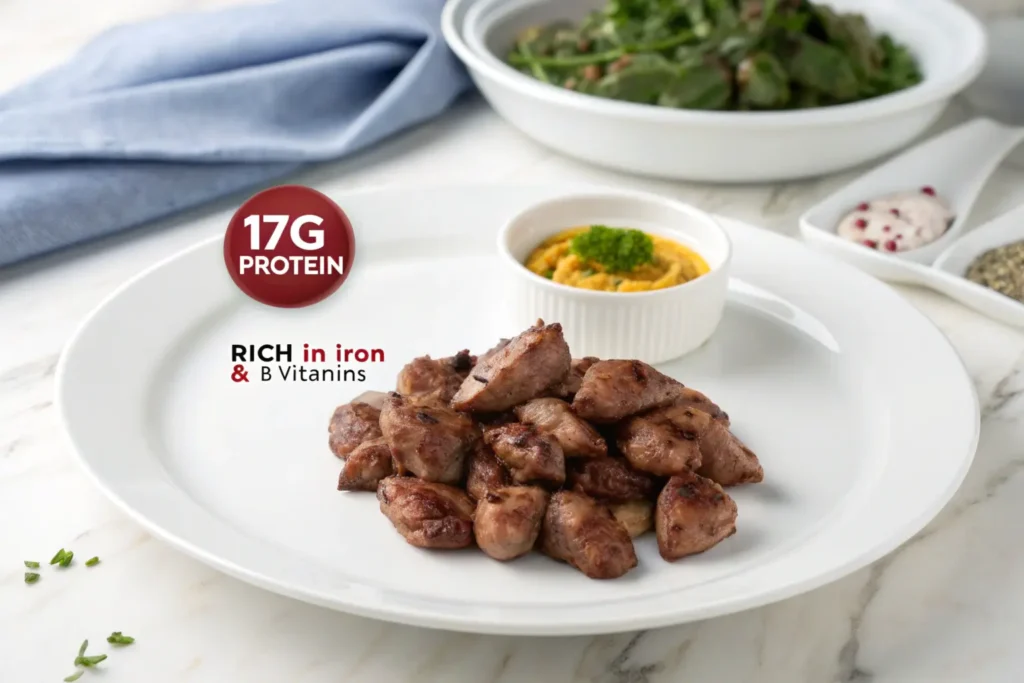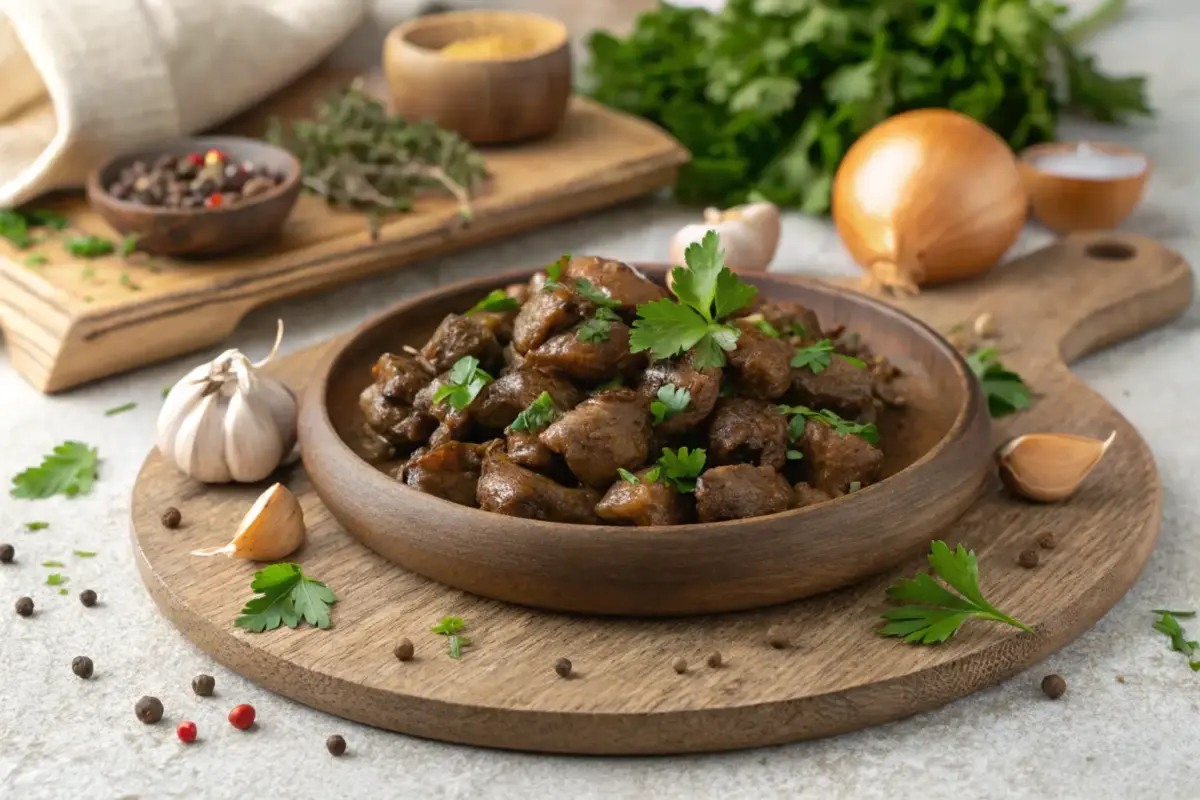Introduction
Are chicken hearts healthy to eat? It’s a question popping up more often as people look for affordable, nutrient-packed foods. Chicken hearts may not be the star of the grocery store, but they’re worth a second look. These small yet mighty organ meats are loaded with protein, vitamins, and minerals, making them a surprising powerhouse for your plate. Plus, they’re versatile, affordable, and easy to cook—perfect for anyone looking to shake up their usual meal routine.
Sure, organ meats might feel unfamiliar at first, but trust me, chicken hearts are a great starting point. Their mild flavor and tender texture make them approachable, even for beginners. Whether you’re grilling them for a barbecue, tossing them in a stir-fry, or exploring traditional recipes from around the globe, they fit right in. So, are chicken hearts healthy to eat? Stick around, and you’ll see why they’re a hidden gem that deserves some serious attention.
Nutritional Composition of Chicken Hearts

Protein Content in Chicken Hearts
If you’ve ever wondered, are chicken hearts healthy to eat, their protein content alone is a big reason why the answer is yes. A 100-gram serving provides around 17 grams of high-quality protein, making them ideal for muscle building and post-workout recovery. If you’re exploring new recipes, try sautéed chicken hearts to enjoy this nutrient-packed delicacy.
Vitamins and Minerals Found in Chicken Hearts
One of the reasons people ask, are chicken hearts healthy to eat, is their incredible nutrient density. They’re rich in iron, zinc, and selenium, all vital for energy and immune function. Plus, chicken hearts are loaded with B vitamins, especially B12, which is crucial for brain health and red blood cell production.
Calorie and Fat Breakdown
To answer the question, are chicken hearts healthy to eat, we also need to consider their calorie and fat content. A 100-gram serving has around 185 calories, with a balance of protein and healthy fats. Most of the fats are unsaturated, making chicken hearts a nutrient-dense but heart-healthy option when consumed in moderation.
Health Benefits of Chicken Hearts
Boosting Muscle Growth and Repair
Chicken hearts are a powerhouse when it comes to muscle repair and growth. If you’ve asked yourself, are chicken hearts healthy to eat for active individuals, the answer is a resounding yes. Their protein content helps repair tissues and keeps your body fueled after workouts.
Supporting Cardiovascular Health
Another way to address the question, are chicken hearts healthy to eat, is to look at their benefits for heart health. They’re a great source of CoQ10, a compound known to improve cardiovascular function and reduce oxidative stress. Including them in your diet might actually be good for your heart.
Enhancing Energy Levels Through Nutrient Density
If you’re feeling drained, chicken hearts can help. Are chicken hearts healthy to eat for energy? Absolutely. Their high levels of iron and B vitamins work together to boost oxygen transport and reduce fatigue, keeping you energized throughout the day.
Strengthening Immune System Function
Finally, are chicken hearts healthy to eat when it comes to immunity? They provide key nutrients like zinc and selenium, which strengthen your immune response and help your body fight infections. Adding them to your meals is an easy way to stay healthier.
Potential Downsides of Consuming Chicken Hearts
Cholesterol Levels in Chicken Hearts
Chicken hearts may be nutrient-rich, but they aren’t entirely free of concerns. One of the most debated issues is their cholesterol content. A 100-gram serving contains around 242 milligrams of cholesterol, which might sound high if you’re keeping an eye on your heart health. While dietary cholesterol doesn’t affect everyone equally, those with existing conditions or a history of high cholesterol should enjoy chicken hearts in moderation and balance them with other low-cholesterol foods.
Risks of Overconsumption
We’ve all heard the saying, too much of a good thing can be bad. The same goes for chicken hearts. Overloading your diet with organ meats might lead to an excessive intake of certain nutrients like iron or vitamin A, which can be harmful in large amounts. The key is variety. Mix chicken hearts with other proteins and veggies to keep your meals balanced and avoid nutrient overload.
Ethical and Sourcing Considerations
Eating chicken hearts can raise some ethical and environmental questions. Are the chickens raised humanely? Were they sourced sustainably? These are valid concerns for many people today. To make an informed choice, look for products labeled free-range or organic. Supporting local farmers or trusted suppliers can also ensure the chicken hearts you’re buying align with your values.
Comparing Chicken Hearts to Other Organ Meats
Nutritional Differences
How do chicken hearts stack up against other organ meats like liver or kidneys? While chicken hearts are high in protein and CoQ10, liver tends to outshine them in terms of vitamin A content. On the other hand, kidneys might have slightly lower cholesterol but less protein per serving. Each organ meat has its strengths, so rotating between them can help you get a wider range of nutrients in your diet.
Popularity and Culinary Uses
When it comes to popularity, liver often steals the spotlight. But chicken hearts have their own fan base, especially in cuisines that embrace nose-to-tail eating. Unlike liver’s bold, almost metallic flavor, chicken hearts have a milder, slightly chewy texture that makes them easier to love for beginners. From skewers at Brazilian churrascarias to stir-fries in Asian cuisine, they’re versatile and surprisingly easy to cook.
How to Prepare and Cook Chicken Hearts
Cooking Techniques for Optimal Nutrition
Cooking chicken hearts isn’t as complicated as you might think. The key is keeping things simple to preserve their nutritional value. Quick methods like grilling, pan-frying, or stir-frying work best. Marinating them beforehand can tenderize the meat and boost the flavor. Avoid overcooking, as that can make them tough and chewy. Whether you’re tossing them in a hot skillet or skewering them for the grill, a little seasoning goes a long way.
Popular Recipes Incorporating Chicken Hearts
If you’re new to chicken hearts, start with easy recipes. Brazilian-style skewers seasoned with garlic and olive oil are a classic crowd-pleaser. For something heartier, try a savory stew with onions, tomatoes, and spices. Want a quick meal? Stir-fry them with soy sauce, ginger, and fresh veggies for a nutrient-packed dish. You can also toss them into salads or pasta dishes for an adventurous twist.
Chicken Hearts in Different Cuisines
Asian Culinary Traditions
In Asian cuisines, chicken hearts are often treated as a delicacy. Japanese chefs grill them as yakitori, glazing each skewer with a savory soy-based sauce. Meanwhile, the Philippines incorporates them into isaw, a popular street food that features marinated and grilled chicken parts. In China, you’ll find chicken hearts in stir-fries or hot pots, where they soak up bold flavors like garlic, ginger, and chili for a spicy kick.
European and South American Dishes
Europe and South America also embrace chicken hearts in traditional cooking. In Brazil, they’re a staple at barbecues, grilled to perfection and seasoned simply with salt. Eastern European recipes often use them in soups and stews, where their rich flavor adds depth. Across the board, chicken hearts are celebrated for their affordability and versatility in creating comforting, flavorful meals.
Sustainability and Chicken Heart Consumption
Are chicken hearts healthy to eat from an environmental perspective? Absolutely. Including chicken hearts in your diet supports the nose-to-tail movement, which focuses on reducing food waste by using every part of the animal. By eating organ meats like chicken hearts, we honor the full value of the animal and cut down on unnecessary waste.
Compared to beef or pork, chicken farming has a smaller environmental footprint, making chicken hearts a more sustainable protein choice. Plus, these little powerhouses are often an affordable option, giving you great nutritional value without breaking the bank. Opting for locally sourced or organic chicken hearts further reduces their environmental impact while supporting ethical farming practices.
When we ask, are chicken hearts healthy to eat, it’s not just about personal health—it’s about the planet too. By choosing chicken hearts, you’re making a conscious decision that benefits both your body and the environment, one delicious bite at a time.
Addressing Common Misconceptions About Chicken Hearts
When it comes to organ meats, questions like, are chicken hearts healthy to eat, often come with a side of skepticism. Many people assume that organ meats are too strong in flavor or challenging to cook, but chicken hearts break that mold. Their taste is surprisingly mild, and with the right seasoning, they can complement a variety of dishes effortlessly.
Another common myth is that chicken hearts are unhealthy due to their cholesterol content. While it’s true they contain cholesterol, when eaten in moderation as part of a balanced diet, they can provide an impressive array of nutrients, including iron, zinc, and B vitamins. These nutrients play vital roles in energy production and overall health.
Finally, some think organ meats are reserved for exotic cuisines or advanced cooking skills. The truth? Chicken hearts are beginner-friendly, versatile, and delicious. If you’ve ever wondered, are chicken hearts healthy to eat, it’s time to give them a try and see for yourself.
FAQs
Is chicken heart good or bad for you?
Chicken hearts are good for you when eaten in moderation. They’re packed with protein, vitamins, and minerals like iron and zinc. However, due to their cholesterol content, it’s best to balance them with other healthy foods in your diet.
Is chicken heart better than breast?
Chicken hearts and chicken breasts each have their strengths. While chicken breasts are leaner and lower in cholesterol, chicken hearts offer a richer nutrient profile with more iron and B vitamins. The choice depends on your dietary needs and preferences.
Is chicken heart a superfood?
Chicken hearts are often considered a superfood because they’re nutrient-dense. They’re loaded with essential vitamins, minerals, and high-quality protein, making them a great addition to a well-rounded diet.
Is chicken meat heart healthy?
Chicken meat, including chicken hearts, can be heart-healthy when consumed as part of a balanced diet. Chicken hearts are rich in CoQ10 and unsaturated fats, which support cardiovascular health. Just keep portion sizes in check to avoid excessive cholesterol intake.
Conclusion
Chicken hearts might not be the most common item on your grocery list, but they’re a hidden gem worth exploring. Packed with protein, essential vitamins, and minerals, they bring a lot to the table for both health-conscious eaters and adventurous food lovers. From their unique flavor to their versatility in recipes, chicken hearts deserve a spot in your kitchen rotation.
Sure, there are some considerations like cholesterol levels and ethical sourcing, but with moderation and mindful choices, chicken hearts can be a delicious and sustainable addition to your diet. Whether you’re grilling them for a barbecue, tossing them into a stir-fry, or experimenting with global flavors, chicken hearts are proof that good things often come in small packages.
So why not give them a try? You just might find yourself becoming a fan of this underrated superfood. It’s time to embrace the full potential of what chicken hearts can offer, from nutrition to culinary creativity.


3 thoughts on “Are Chicken Hearts Healthy to Eat? A Complete Guide to Nutrition and Benefits”